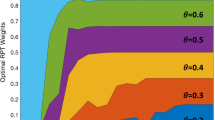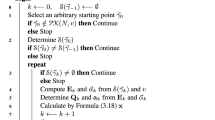Abstract
We present a distribution-free model of incomplete-information games, both with and without private information, in which the players use a robust optimization approach to contend with payoff uncertainty. Our ``robust game'' model relaxes the assumptions of Harsanyi's Bayesian game model, and provides an alternative distribution-free equilibrium concept, which we call ``robust-optimization equilibrium,'' to that of the ex post equilibrium. We prove that the robust-optimization equilibria of an incomplete-information game subsume the ex post equilibria of the game and are, unlike the latter, guaranteed to exist when the game is finite and has bounded payoff uncertainty set. For arbitrary robust finite games with bounded polyhedral payoff uncertainty sets, we show that we can compute a robust-optimization equilibrium by methods analogous to those for identifying a Nash equilibrium of a finite game with complete information. In addition, we present computational results.
Similar content being viewed by others
References
Ben-Tal, A., Nemirovski, A.: Robust convex optimization. Math. Oper. Res. 23 (4), 769–805 (1998)
Ben-Tal, A., Nemirovski, A.: Robust solutions of uncertain linear programs. Oper. Res. Lett. 25 (1), 1–13 (1999)
Ben-Tal, A., Nemirovski, A.: Robust solutions of linear programming problems contaminated with uncertain data. Math. Prog., Ser. A 88, 411–424 (2000)
Bertsekas, D.: Nonlinear Programming, 2nd edn. Athena Scientific, Belmont, MA, 1999
Bertsimas, D., Pachamanova, D., Sim, M.: Robust linear optimization under general norms. Oper. Res. Lett. 32, 510–516 (2004)
Bertsimas, D., Sim, M.: Robust discrete optimization and network flows. Math. Prog. 98, 49–71 (2003)
Bertsimas, D., Sim, M.: The price of robustness. Oper. Res. 52 (1), 35–53 (2004)
Bohnenblust, H., Karlin, S.: On a theorem of Ville. In: H. Kuhn, A. Tucker (eds.), Contributions to the theory of games, vol. 1, Princeton UP, Princeton, 1950, pp. 155–160
Borodin, A., El-Yaniv, R.: Online computation and competitive analysis. Cambridge UP, New York, 1998
Brouwer, L.: Uber abbildung von mannigfaltikeiten. Mathematische Annalen 71, 97–115 (1912)
Courant, R.: Variational methods for the solution of problems of equilibrium and vibrations. Bull. Am. Math. Soc. 49, 1–23 (1943)
Crémer, J., McLean, R.: Optimal selling strategies under uncertainty for a discriminating monopolist when demands are interdependent. Econometrica 53 (2), 345–362 (1985)
Datta, R.: Using computer algebra to find Nash equilibria. In: J. Senda (ed.), Proc. 2003 Intl. Symp. on Symb. and Alg. Comp., ACM Press, New York, 2003, pp. 74–79
Debreu, G.: A social equilibrium existence theorem. Proc. Nat. Acad. Sci., USA 38, 886–893 (1952)
Dow, J., Werlang, S.: Nash equilibrium under Knightian uncertainty: Breaking down backward induction. J. Econ. Theory 64, 305–324 (1994)
El Ghaoui, L., Lebret, H.: Robust solutions to least-squares problems with uncertain data. SIAM J. Matrix Analysis and Applications 18 (4), 1035–1064 (1997)
El Ghaoui, L., Oustry, F., Lebret, H.: Robust solutions to uncertain semidefinite programs. SIAM J. Optim. 9 (1), 33–52 (1999)
Fiacco, A., McCormick, G.: Nonlinear programming: Sequential unconstrained minimization techniques. John Wiley & Sons, New York, 1968
Fudenberg, D., Levine, D.: The Theory of Learning in Games. Series on Economic Learning and Social Evolution. MIT Press, Cambridge, MA, 1998
Fudenberg, D., Tirole, J.: Game Theory. MIT Press, Cambridge, MA, 1991
Gilboa, I., Schmeidler, D.: Maxmin expected utility with a non-unique prior. J. Math. Econ. 18, 141–153 (1989)
Goldberg, A., Wright, A., Karlin, A., Hartline, J., Saks, M.: Competitive auctions, 2002. Submitted to Games and Economic Behavior
Govindan, S., Wilson, R.: A global Newton method to compute Nash equilibria. J. Econ. Theory 110, 65–86 (2003)
Harsanyi, J.: Games with incomplete information played by `Bayesian' players, parts I–III. Mgmt. Sci. 14, 159–182,320–334,486–502 (1967, 1968)
Holmström, B., Myerson, R.: Efficient and durable decision rules with incomplete information. Econometrica 51, 1799–1820 (1983)
Holzman, R., Kfir-Dahav, N., Monderer, D., Tennenholtz, M.: Bundling equilibrium in combinatorial auctions. Games and Economic Behavior 47 (1), 104–123 (2004)
Hyafil, N., Boutilier, C.: Regret minimizing equilibria and mechanisms for games with strict type uncertainty. In: Proceedings of the 20th Conference on Uncertainty in Artificial Intelligence (AUAI '04), AUAI Press, Arlington, VA, USA, 2004, pp. 268–277
Kakutani, S.: A generalization of Brouwer's fixed point theorem. Duke Math. J. 8, 457–459 (1941)
Klibanoff, P.: Uncertainty, decision, and normal form games, 1993. Manuscript, MIT
Knight, F.: Risk, Uncertainty and Profit. Houghton Mifflin, Boston, 1921
Lemke, C., Howson, J.: Equilibrium points of bimatrix games. SIAM J. Appl. Math. 12 (2), 413–423 (1964)
Lo, K.: Equilibrium in beliefs under uncertainty. J. Econ. Theory 71 (2), 443–484 (1996)
Ma, T.: Banach-Hilbert spaces, vector measures and group representations. World Scientific, New Jersey, 2002
Marinacci, M.: Ambiguous games. Games and Economic Behavior 31 (2), 191–219 (2000)
McKelvey, R., McLennan, A.: Computation of equilibria in finite games. In: H. Amman, D. Kendrick, J. Rust (eds.), Handbook of computational economics, vol. I, Elsevier, 1996, pp. 87–142
McKelvey, R., McLennan, A., Turocy, T.: Gambit: Software tools for game theory, version 0.97.0.6, 2004. http://econweb.tamu.edu/gambit/
Mertens, J., Zamir, S.: Formulation of Bayesian analysis for games with incomplete information. Intl. J. Game Theory 14 (1), 1–29 (1985)
Morris, S.: The common prior assumption in economic theory. Econ. Philosophy 11, 227–253 (1995)
Nash, J.: Equilibrium points in N-person games. Proc. Nat. Acad. Sci., USA 36, 48–49 (1950)
Nash, J.: Non-cooperative games. Ann. Math. 54 (2), 286–295 (1951)
Osborne, M., Rubenstein, A.: A Course in Game Theory. MIT Press, Cambridge, MA, 1994
Papadimitriou, C.: Algorithms, games, and the internet. In: STOC '01: Proc. 33rd Annual ACM Symposium on the Theory of Computing, ACM Press, New York, 2001, pp. 749–753
Porter, R., Nudelman, E., Shoham, Y.: Simple search methods for finding a Nash equilibrium. In: Proceedings of the 19th National Conference on Artificial Intelligence (AAAI-2004), 2004, pp. 664–669
Scarf, H.: The approximation of fixed points of a continuous mapping. SIAM J. Appl. Math. 15 (5), 1328–1343 (1967)
Scarf, H.: The Computation of Economic Equilibria. Yale UP, New Haven, CT, 1973. In collaboration with T. Hansen
Smart, D.: Fixed Point Theorems. Cambridge UP, New York, 1974
Soyster, A.: Convex programming with set-inclusive constraints and applications to inexact linear programming. Oper. Res. 21, 1154–1157 (1973)
Sturmfels, B.: Solving systems of polynomial equations. American Mathematical Society, Providence, RI, 2002
van der Laan, G., Talman, A.: On the computation of fixed points in the product space of unit simplices and an application to noncooperative N person games. Math. Oper. Res. 7, 1–13 (1982)
van der Laan, G., Talman, A., van der Heyden, L.: Simplicial variable dimension algorithms for solving the nonlinear complementarity problem on a product of unit simplices using a general labeling. Math. Oper. Res. 12, 377–397 (1987)
Verschelde, J.: Algorithm 795: PHCpack: a general-purpose solver for polynomial systems by homotopy continuation. ACM Trans. Math. Softw. 25 (2), 251–276 (1999)
von Neumann, J., Morgenstern, O.: Theory of Games and Economic Behaviour. Princeton UP, 1944
von Stengel, B.: Computing equilibria for two-person games. In: R. Aumann, S. Hart (eds.), Handbook of game theory with economic applications, vol. 3, chap. 45, Elsevier, 2002, pp. 1723–1759
Wardrop, J.: Some theoretical aspects of road traffic research. In: Proceedings of the Institute of Civil Engineers, vol. 1, part II, 1952, pp. 325–78
Wilson, R.: Game-theoretic approaches to trading processes. In: T. Bewley (ed.), Advances in Economic Theory: Fifth World Congress, chap. 2, Cambridge UP, New York, 1987, pp. 33–77
Author information
Authors and Affiliations
Corresponding author
Additional information
The research of the author was partially supported by a National Science Foundation Graduate Research Fellowship and by the Singapore-MIT Alliance.
The research of the author was partially supported by the Singapore-MIT Alliance.
Rights and permissions
About this article
Cite this article
Aghassi, M., Bertsimas, D. Robust game theory. Math. Program. 107, 231–273 (2006). https://doi.org/10.1007/s10107-005-0686-0
Received:
Accepted:
Published:
Issue Date:
DOI: https://doi.org/10.1007/s10107-005-0686-0




